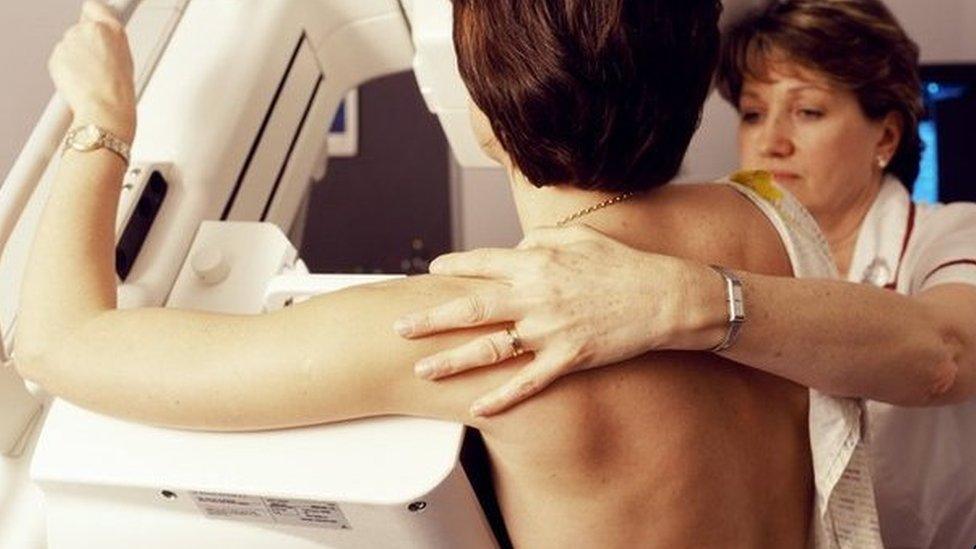NHS operations: Waiting times to rise in 'trade-off', boss says
- Published
'We're committed to quick operations on the NHS' - NHS England boss Simon Stevens
Patients will face longer waits for operations such as knee and hip replacements in a "trade-off" for improved care in other areas, NHS England boss Simon Stevens says.
He said growing pressures meant he could no longer guarantee treatment in the 18-week target time.
GPs will also have to cut the number of patients they refer to hospital and use alternatives such as physio instead.
But Mr Stevens said in return there would be quicker cancer and A&E care.
Mr Stevens was unveiling a progress report on his five-year strategy for the health service, launched in 2014.
He said demand was rising at a quicker rate than expected and so compromises had to be made.
"There is a trade-off here - we do expect there will be some marginal lengthening of waiting lists, but this will still represent a strong, quick experience compared to 10 years ago, let alone 20."

But Clare Marx, president of the Royal College of Surgeons in England, said the delays could have more serious consequences.
"Our concern is not only for hip and knee patients but those patients who perhaps are waiting for heart surgery. They may have a heart attack whilst they are waiting," she said.
Are you waiting for an operation or cancer care? Have you waited in A&E? Get in touch by emailing haveyoursay@bbc.co.uk, external.
Meeting the NHS's funding demands
How long will patients have to wait?
Patients waiting for a hospital operation are meant to be seen within 18 weeks.
But there are currently more than 360,000 patients on the waiting list who have waited longer than that, which is one in 10 of the total - a proportion that has almost doubled in four years.
Mr Stevens said he expected that to get worse over the next couple of years but it needed to be seen in context of the situation a decade ago, when nearly half of patients were waiting longer than 18 weeks.
Niall Dickson, chief executive of the NHS Confederation, which represents NHS trusts, said: "I think it is completely unreasonable to expect NHS services to provide everything when the restrictions on funding and the demand is rising all the time."
To reduce waiting lists, GPs are being asked to look at how many patients they are referring to hospital - and whether other options, such as physiotherapy, would be more appropriate than operations.
Mr Stevens said this process could lead to hundreds of thousands fewer patients being referred to hospital.
But Age UK's Caroline Abrahams criticised the move, saying it would lead to "misery and pain" for older people and make it harder for them to maintain their independence.
Curbing drug spending

The NHS spends about £16bn a year on drugs and medicines. But the bill has been rising quickly - up 7% in the past year.
This is the largest area of spending after staffing.
Firstly, a cap has been set on the bill for new drugs. The rollout of any new treatments that are going to cost the NHS more than £20m a year will now be delayed to give health bosses time to open talks with the industry on price.
Secondly, NHS England has said it will review "low value" medicines, such as suncream, gluten-free foods and some painkillers, which could save £400m a year.
Both of these steps had already been announced prior to this report.
A&E waits to get shorter
The four-hour A&E target is to stay. Hospitals have been asked to start hitting the 95% threshold again by March 2018. Current performance stands at just over 85%.
To help, each hospital is being asked to introduce GP triaging, where doctors on the front door advise patients with minor illnesses and injuries of other places they can get help.
NHS England has promised that half the population will have access to evening and weekend GP opening by March 2018, with the rest of the country following a year later.
Rapid cancer diagnosis

Another area that will be prioritised will be cancer care. A strategy was launched in 2015 setting out a vision for "world-class" services by 2020.
This latest report highlights an upgrade of radiotherapy equipment and the introduction of 10 new rapid diagnostic centres by next March.
The latter will house a range of specialists under one roof, meaning patients will no longer have to be referred back and forth between GP and specialist.
These steps, NHS England said, will help achieve the ambition of ensuring cancer diagnoses are made within four weeks by 2020, and lead to the 62-day target for cancer treatment to once again be hit - it has been missed for much of the past 18 months.
But Mr Stevens admitted the NHS needed more staff in this area.
But what about the money?
One area Mr Stevens refused to be drawn on was money. When he launched his five-year strategy, he explicitly asked for £8bn of extra funding for the NHS.
Ministers gave the front line the extra money this Parliament, but in doing so cut other areas of the wider health budget, including training programmes for staff and funding for healthy lifestyle schemes, such as stop-smoking services.
Mr Stevens said this report was about what the NHS could "deliver" within the current level of funding, not about whether the budget was enough.
However, when asked, he refused to say he was happy with the amount of money the NHS was getting.
But others have not been so reticent. Dr Mark Porter, of the British Medical Association, said: "Achieving one delivery promise only by missing another is a textbook example of rationing access to care. It should not be happening in today's NHS."